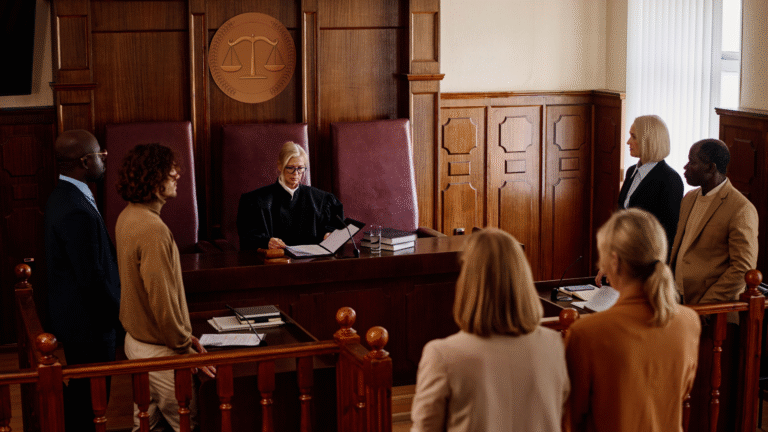Domestic violence cases are taken seriously across all jurisdictions, and if you or someone you know is facing these charges, understanding your legal defense options is critical. Each case is unique, but knowing how legal defense works in court and what rights you have during a police investigation can make all the difference. This guide covers the ten most common domestic violence charges and the legal strategies often used in response.

1. Physical Assault Against a Partner
The most common charge in domestic violence cases is physical assault. This involves physical harm or the threat of it toward a spouse, partner, or family member.
Legal defense strategies may include self-defense, lack of intent, or evidence that no physical contact occurred. A court appointed legal defense lawyer can help build a case based on medical reports and witness testimonies.
2. Aggravated Assault with a Weapon
Aggravated assault typically involves a weapon or serious bodily injury. This charge is a felony in most states and carries significant penalties.
Here, criminal law legal defense strategies may center around proving the weapon was not used, or that the accused was defending themselves or others.
3. False Imprisonment or Unlawful Restraint
Restraining someone against their will—even without causing physical harm—can result in a charge of false imprisonment.
A solid legal defense in court proceedings may argue that the accuser was free to leave or that the situation was misunderstood. Legal counsel might also question the timing or credibility of the report.
4. Emotional or Psychological Abuse
Domestic violence isn’t always physical. Repeated verbal threats, intimidation, or manipulation can lead to emotional abuse charges.
Defending against such charges often requires showing the lack of intent to harm or insufficient evidence. Legal defense for police interrogation becomes especially important here, as statements made early can impact the whole case.
5. Stalking or Harassment
Repeatedly following or contacting a partner against their will can lead to stalking charges, especially with digital communication involved.
A strong legal defense under criminal law might focus on lack of evidence of intent or claim of mutual communication. Documenting past interactions can help the defense clarify context.
6. Violating a Restraining or Protection Order
Once a restraining order is issued, violating it—even accidentally—can result in additional charges.
A legal defense from arrest to court may show the accused was unaware of the order’s boundaries or that the violation was unintentional. Law enforcement legal defense rights become crucial in these situations.
7. Criminal Threats
Threatening serious harm, even without carrying it out, can be charged as a criminal threat.
Common legal defense criminal threat charges include challenging the credibility of the accuser or proving there was no intent or capability to follow through on the threat.
8. Sexual Abuse or Coercion
This is among the most serious domestic violence charges. It involves unwanted sexual contact or coercion, often within relationships.
A constitutional law legal defense will demand credible evidence, clear timelines, and may involve cross-examination of witness testimonies.
9. Child Endangerment in Domestic Settings
If children are present during violent incidents or are harmed indirectly, child endangerment charges may apply.
A defense strategy can argue that the child was not at risk, or that another adult was responsible. Proper legal support is critical when dealing with family court alongside criminal proceedings.
10. Property Destruction as Intimidation
Breaking furniture, smashing phones, or destroying property during a domestic dispute can be used as evidence of intimidation.
Your legal defense during police investigation may present these actions as non-threatening or accidental. Legal representation should review whether the destruction was exaggerated or misinterpreted.
How Legal Defense Works in Domestic Violence Cases
The process usually begins with arrest or complaint. From the moment of arrest, you have the right to remain silent and seek legal representation. If you cannot afford one, a court appointed legal defense lawyer will represent you.
Understanding how legal defense works in court involves several stages:
- Police Investigation: Your lawyer will ensure your law enforcement legal defense rights are respected and evidence collected fairly.
- Pre-trial Hearings: This is where early dismissals can occur if the prosecution’s evidence is weak.
- Trial: Your lawyer will challenge evidence, cross-examine witnesses, and present your side using criminal law legal defense strategies.
A critical part of every case is whether police misconduct legal defense applies. If evidence was gathered improperly or if your rights were violated, that can weaken the prosecution significantly.
Common Challenges in Domestic Violence Legal Defense
While every person is presumed innocent until proven guilty, domestic violence charges often carry a social stigma. Here are key challenges defendants may face:
- Bias during investigation
- One-sided protection orders
- Lack of physical evidence in emotional abuse cases
- Pressure to accept plea bargains
It’s essential to work with someone who knows how to navigate these legal pitfalls.
Importance of a Strong Legal Defense Team
Domestic violence accusations can lead to jail time, loss of custody, employment issues, and a permanent criminal record. Whether you’re defending yourself in a wrongful accusation or negotiating a lesser charge, professional legal defense is your best path forward.
A knowledgeable attorney will understand both legal defense for police interrogation and how to argue your case in court convincingly.
FAQs
1. What is the best legal defense for domestic violence charges?
The best legal defense depends on the case. Common strategies include self-defense, lack of evidence, or disproving intent. A qualified attorney can guide you through the right strategy.
2. Can a victim drop domestic violence charges?
While a victim can express their desire to drop charges, only the prosecutor can decide whether to proceed with the case.
3. Do I need a lawyer if I’m falsely accused?
Yes. A legal defense under criminal law is still necessary, even for false allegations, to avoid damaging consequences.
4. What are my rights during a police investigation for domestic violence?
You have the right to remain silent, to refuse searches without a warrant, and to request a lawyer. These are key aspects of your law enforcement legal defense rights.
5. Can I defend myself in court for domestic violence charges?
It’s legally allowed but not recommended. Domestic violence laws are complex, and a court appointed legal defense lawyer is usually a better option if private counsel isn’t affordable.







